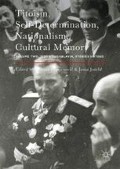Abstract
A single point that everyone can agree upon is that during its existence Tito’s Yugoslavia represented many different things to many different people around the globe. For example, in 1999, Tito was classified by Time magazine, 19 years after his death, as one of the ‘100 Most Important People of the Twentieth Century’. Titoism as a cultural phenomenon in Yugoslavia was already in motion during the 1950s. It was a cultural phenomenon well combined with the public Communist ideology that was systematically presented as ‘savior’ and therefore had a monopolistic position as official ideology and culture. In the beginning, this combination was necessary for the recovery of the newly born nation, as an ideological glue for patching up the rifle holes in common memory so that the country could be built from the ruins. As World War II and revolutionary totalitarianism increasingly became distant memories slowly fading away, the cult was only growing in size and intensity. Titoism as a cult was a complex issue. First, Tito was a leader of the anti-fascist movement that resulted in liberation of the country. After the war, he quickly became a symbol of an absolute authority (politically, military, and symbolically) by becoming general secretary of the KPJ and the country’s lifelong president and army marshal/commandant. The symbolism employed in the development of the cult was clearly a result of a process (during and after the war, and many years after), rather than a marketing strategy.
Access this chapter
Tax calculation will be finalised at checkout
Purchases are for personal use only
Author information
Authors and Affiliations
Editor information
Editors and Affiliations
Copyright information
© 2016 The Editor(s) (if applicable) and The Author(s)
About this chapter
Cite this chapter
Ognjenović, G., Jozelić, J. (2016). Introduction. In: Ognjenović, G., Jozelić, J. (eds) Titoism, Self-Determination, Nationalism, Cultural Memory. Palgrave Macmillan, New York. https://doi.org/10.1057/978-1-137-59747-2_1
Download citation
DOI: https://doi.org/10.1057/978-1-137-59747-2_1
Published:
Publisher Name: Palgrave Macmillan, New York
Print ISBN: 978-1-137-59745-8
Online ISBN: 978-1-137-59747-2
eBook Packages: HistoryHistory (R0)

